In the heart of Historical Bahia, the Pelourinho neighborhood stands as a testament to the city’s rich past and architectural splendor. Cobblestone streets lined with colorful colonial buildings lead visitors on a journey through time, offering a glimpse into the stories of centuries gone by.
As one immerses themselves in the vibrant hues and intricate details of Bahia’s historical architecture, a sense of wonder and curiosity begins to stir. But what tales lie hidden within these ancient walls, and what secrets do they hold that continue to intrigue travelers from around the world?
Key Points
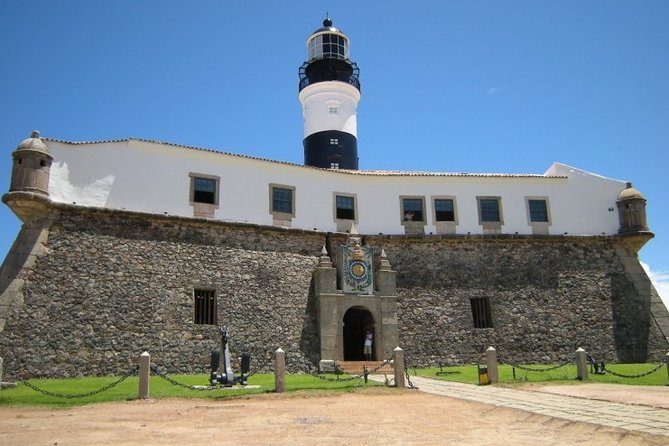
- Bahia’s colonial architecture reflects a rich blend of European and indigenous influences.
- Indigenous artistry and symbols are integral to Bahia’s cultural heritage.
- The legacy of the slave trade shapes Bahia’s identity and societal dynamics.
- Historical landmarks and preservation efforts highlight Bahia’s diverse and complex history.
Bahia’s Colonial Architecture
In Bahia, the colonial architecture stands as a testament to the rich history and cultural heritage of the region. Influenced by colonial styles from Portugal, Bahia’s architecture showcases a blend of European and local elements.
The preservation of these architectural gems is a priority in Bahia, with many buildings meticulously maintained to retain their original charm. Walking through the cobbled streets, visitors can admire the intricate details of colonial facades, colorful houses, and ornate churches that date back centuries.
The fusion of colonial influences with indigenous craftsmanship creates a unique architectural landscape that captivates all who explore Bahia. This commitment to architectural preservation ensures that future generations can continue to appreciate the historical significance of Bahia’s colonial structures.
You can also read our reviews of more tours and experiences in Salvador da Bahia.
Indigenous Influence in Bahia
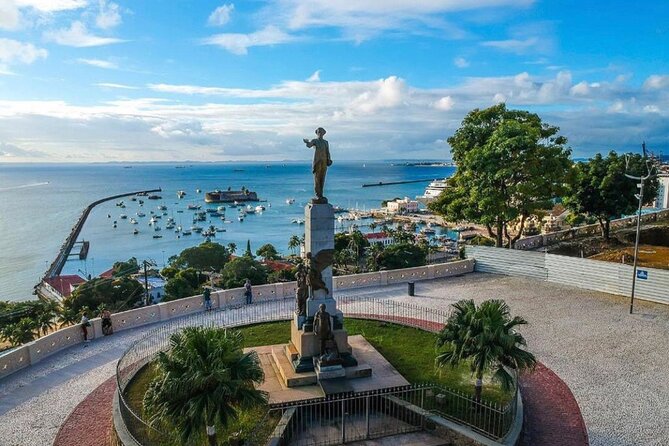
Bahia’s architectural landscape not only reflects colonial influences but also bears the distinctive marks of indigenous craftsmanship, adding a rich layer of cultural depth to the region’s heritage. Indigenous traditions in Bahia have played a vital role in shaping the local artistry and design elements seen in buildings and structures across the region. This influence highlights the interconnectedness between the indigenous communities and the broader Bahian society, showcasing a blend of traditions and styles that have stood the test of time.
Cultural assimilation is evident in the seamless integration of indigenous motifs and techniques into the colonial architecture, creating a unique fusion that speaks to the history of Bahia’s diverse cultural heritage.
- Preservation of Indigenous Artistry
- Integration of Indigenous Symbols
- Celebration of Indigenous Heritage
Slave Trade History in Bahia
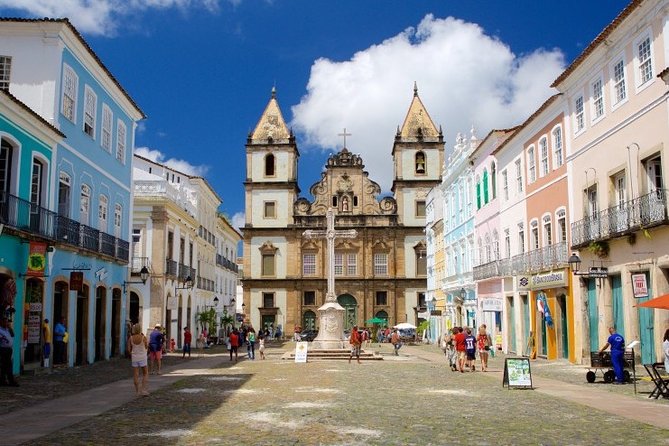
The haunting legacy of the transatlantic slave trade echoes through the very streets and structures of historical Bahia, revealing a pivotal chapter in the region’s tumultuous past.
The impact of this dark period is still felt today, shaping the cultural fabric and social dynamics of Bahia. The remnants of the slave trade serve as a stark reminder of the atrocities that once took place, influencing the modern connections between Afro-Brazilian communities and their heritage.
From the Pelourinho district to the Afro-Brazilian museum, visitors can witness firsthand the lasting effects of this brutal history. The slave trade history in Bahia is a somber yet essential element in understanding the region’s complex identity and its ongoing journey towards reconciliation.
Historical Landmarks of Bahia
Amidst the vibrant streets and rich cultural tapestry of Bahia, stand the enduring historical landmarks that narrate tales of the region’s past.
Bahia’s archaeological discoveries unveil ancient civilizations that once thrived in the region, offering a glimpse into their way of life and customs.
These historical sites serve as a reminder of the diverse influences that have shaped Bahia, including Bahia’s religious influences which are evident in the intricate architecture and sacred spaces scattered throughout the land.
Visitors can explore these landmarks to gain a deeper understanding of Bahia’s roots and the significant role religion has played in shaping its history.
Each stone and structure echoes with the stories of the past, inviting all to unravel the mysteries of Bahia’s heritage.
Bahia’s Cultural Heritage Sites
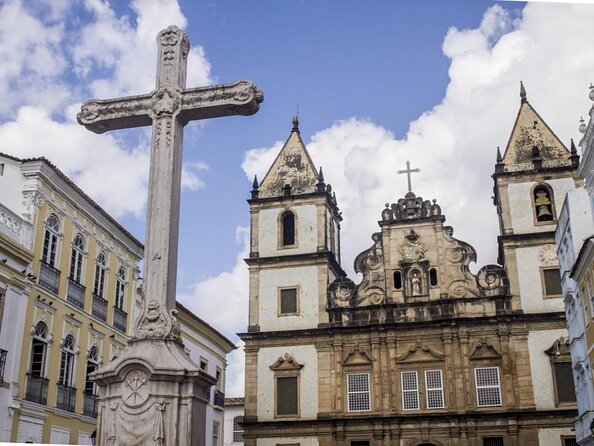
Set out on a captivating journey through the cultural heritage sites of Bahia, delving into the soul of this vibrant region. Bahia boasts a rich history that’s meticulously preserved through cultural preservation and heritage conservation efforts.
Visitors can explore the Pelourinho district in Salvador, a UNESCO World Heritage Site renowned for its colorful colonial architecture and historical significance. The Sao Francisco Church and Convent of Salvador, adorned with intricate golden woodwork and stunning azulejos tiles, is a testament to Bahia’s cultural richness.
The Afro-Brazilian Museum showcases the influence of African heritage on Bahia’s culture, offering a glimpse into the region’s diverse roots. These sites not only narrate Bahia’s past but also serve as pillars for its future preservation and appreciation.
Evolution of Bahia’s Economy
Exploring Bahia’s rich cultural heritage unveils a compelling narrative that intertwines with the dynamic evolution of its economy over the centuries. Bahia has experienced significant economic transformation, shaping its current financial landscape.
The historical significance of trade routes in Bahia has been instrumental in fostering economic growth and cultural exchange. The evolution of Bahia’s economy reflects a blend of indigenous, African, and European influences, contributing to its diverse economic sectors and vibrant commercial activities.
Over time, Bahia has adapted to changing global markets, capitalizing on its strategic location and rich resources to establish itself as a key player in regional trade networks. The economic resilience and entrepreneurial spirit of Bahia continue to drive its prosperity and position as a dynamic economic hub in the region.
Common questions
What Are the Best Local Restaurants to Try in Bahia for Authentic Cuisine?
For authentic cuisine in Bahia, visitors can explore street food options for a taste of local flavors. They can also partake in cooking classes to learn traditional recipes firsthand, creating a memorable culinary experience during their stay.
Are There Any Traditional Festivals or Celebrations That Take Place in Bahia Throughout the Year?
In Bahia, traditional festivals and celebrations occur throughout the year, featuring vibrant cultural performances and colorful traditional attire. These events immerse visitors in the rich local customs and offer a unique glimpse into Bahia’s cultural heritage.
How Can Visitors Best Experience the Local Music and Dance Scene in Bahia?
Visitors can enjoy Bahia’s vibrant music and dance scene by exploring local markets for authentic Afro-Brazilian culture. Experience the rhythmic beats of Capoeira, witness street art displays, and engage with the rich cultural heritage firsthand.
Are There Any Hidden Gems or Off-The-Beaten-Path Attractions in Bahia That Are Worth Exploring?
For those seeking hidden gems and unique cultural experiences in Bahia, visitors can explore lesser-known attractions off the beaten path. Discovering these local treasures offers a glimpse into the authentic and vibrant essence of this region.
What Are Some Recommended Day Trips or Excursions From Bahia for Those Looking to Explore Beyond the City?
For those looking to explore beyond the city in Bahia, they can embark on exciting day trips to indulge in outdoor adventures in nature reserves or explore the region’s rich cultural heritage by visiting historical sites.
Final Words
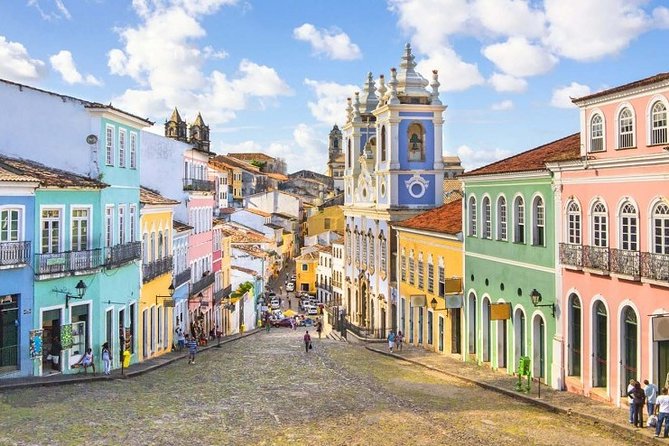
As the sun sets on Historical Bahia, the echoes of its rich past linger in the air, weaving a tapestry of culture, heritage, and resilience. From the colonial architecture to the indigenous influences, from the haunting history of the slave trade to the vibrant cultural heritage sites, Bahia’s story is one of evolution and transformation.
Visitors are invited to enjoy this captivating journey through time, where the spirit of Bahia’s history lives on in every cobblestone street and colorful facade.
